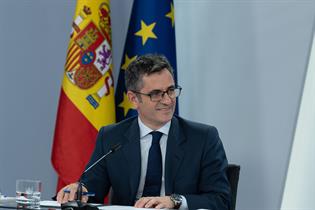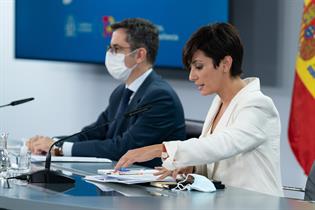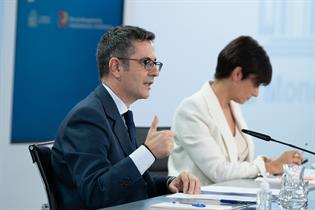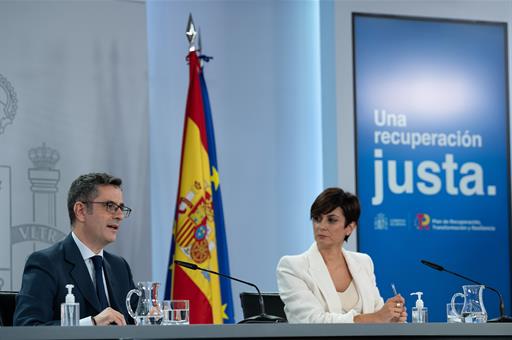Council of Ministers
The Government approves urgent support measures for La Palma worth more than 213 million euros
Council of Ministers - 2021.10.5
Moncloa Palace, Madrid
By means of a Royal Decree-Law, the Government has approved a set of urgent measures to alleviate the damage caused by the volcanic eruption on La Palma. These actions, amounting to almost 214 million euros, are in addition to those already agreed at last week's Council of Ministers.
The Minister for the Presidency, Parliamentary Relations and Democratic Memory, Félix Bolaños, has reiterated that the reconstruction of the island of La Palma is an absolute priority for the Government to alleviate the damage suffered to its inhabitants and to ensure that aid arrives quickly and swiftly. In fact, he assured that the 10.5 million euros approved last week for aid for housing and material goods is already available to the Canary Island authorities.
Direct aid to those affected
The subsidies and direct aid approved today are aimed at alleviating damage to housing, premises, the productive, agricultural and fishing environment, infrastructure and the environment.
Regarding housing and businesses, Bolaños detailed, direct aid is available for natural and legal persons for cases of destruction or structural damage, while in the case of the agricultural and fisheries sector, 20.3 million euros will be earmarked for damage to irrigation and rural roads and for fishing and aquaculture. It also provides for the exchange of affected land for other publicly owned land on which the agri-foodstuffs holdings can be relocated.
The repair of infrastructure is articulated through aid to local entities totalling 22 million euros, as well as support to the Regional Government of the Canary Islands and the Island Councils to restore the road network, with 40.5 million euros. In terms of natural areas, funds are available for the La Palma Biosphere Reserve, the Caldera de Taburiente National Park and research into the volcano and its eruptions. Bolaños stressed the fundamental role of science, especially for prevention.
Boosting the island's economic and social recovery
 Foto: Pool Moncloa/Borja Puig de la BellacasaIn labour, the text includes an extraordinary training and employment plan for 63 million euros; a moratorium of up to one year without interest on the payment of accrued contributions - between October and January - and the possibility of early redemption of pension plans and funds, as occurred during the pandemic.
Foto: Pool Moncloa/Borja Puig de la BellacasaIn labour, the text includes an extraordinary training and employment plan for 63 million euros; a moratorium of up to one year without interest on the payment of accrued contributions - between October and January - and the possibility of early redemption of pension plans and funds, as occurred during the pandemic.
The tax measures, the minister continued, include the exemption of homes and establishments damaged by lava from the 2021 Real Estate Tax, the reduction of Economic Activities Tax payments, the deferral of tax debts and the extraordinary bonus in the regional incentive system to boost business investment on the island. In addition, self-employed people and companies will be able to temporarily suspend electricity supply contracts and terminate contracts for destroyed installations.
Extraordinary funding of one million euros is also envisaged for the Canary Islands for the basic provision of social services and care for victims of gender-based violence. Other actions, the minister concluded, are aimed at protecting consumers - including the suspension of interest and principal payment obligations for loans and credits, with and without mortgage guarantees - and making it easier for citizens who have lost their homes to prove the situation they are in.
Consistency and coordination
Félix Bolaños has guaranteed that the Government is committed to working constantly and in coordination with all public administrations, since, he said, "the public sector is the ultimate safety net for all citizens in the event of emergencies".
The minister praised the "exemplary" collaboration and institutional loyalty between the Spanish and Canary Islands Governments, the City Hall of La Palma and the local councils, which have met twice since the Joint Committee for the reconstruction, recovery and support of the island of La Palma was set up last week: "We all aim to mitigate the damage and not to let anyone start their life project from scratch".
With regard to the Interministerial Committee for the implementation of the Special Plan for the Reconstruction of La Palma, which met yesterday, Bolaños emphasised its key role in finalising the measures approved today, in which seventeen ministries participated in the preparation.
Boosting residential renovations and social housing
 Foto: Pool Moncloa/Borja Puig de la BellacasaThe Executive has regulated the aid programmes for residential renovations and social housing construction under the Recovery, Transformation and Resilience Plan (RTRP). This will make it possible to implement two of the Plan's main investments of 4.42 billion euros.
Foto: Pool Moncloa/Borja Puig de la BellacasaThe Executive has regulated the aid programmes for residential renovations and social housing construction under the Recovery, Transformation and Resilience Plan (RTRP). This will make it possible to implement two of the Plan's main investments of 4.42 billion euros.
The Minister for Territorial Policy and Government spokesperson, Isabel Rodríguez, has stressed that the plan envisages the construction of up to 20,000 new public housing units for social rent, with an investment of 1 billion euros.
In addition to the rehabilitation of private dwellings, the programme includes the possibility of renovating entire neighbourhoods. The spokesperson specified that subsidies will be granted for up to 80% of the actions, with a maximum of 21,400 euros per property. In case of social or economic vulnerability, aid may cover up to 100% of the cost of improvements to buildings, neighbourhoods and homes. In addition, the deployment of local offices will be supported to facilitate information and grant management.
In the same area, the Council of Ministers has approved urgent measures to promote building renovation in the context of the RTRP. Three deductions are introduced in Personal Income Tax (IRPF) - up to 60% - for works to improve energy efficiency in homes and residential buildings; decisions to carry out works to increase the efficiency of a building are facilitated; and a guarantees facility from the Official Credit Institute (ICO) is created for 1.1 billion euros to favour access to financing.
The spokesperson stressed that these two agreements, totalling more than 5.5 billion euros, will help to promote the emancipation of young people and complement other decisions already taken to increase their employability, qualifications, vocational training and the minimum wage.
Isabel Rodríguez added that housing policy is an axis of transformation for Spain because it is cross-cutting and will contribute to the modernisation of infrastructure and the retraining of construction professionals, it will provide job opportunities for young people and the energy transformation of the country: "Perhaps it hits all the right notes in the recovery plan and will generate jobs in the short term.
For his part, the Minister for the Presidency, Parliamentary Relations and Democratic Memory has advanced that the future housing law will be the first state law in this era of democracy and will guarantee the right to a decent home for those groups that have the greatest difficulties in making ends meet and for young people who find it difficult to emancipate themselves. "We are going to contain and reduce rental prices and we are going to significantly increase the public housing stock, also for rent", he remarked. 30% of the houses to be built will be for social housing and half of these will be for social rent.
Félix Bolaños also referred to the announcement by the President of the Government of Spain, Pedro Sánchez, who has announced that the General State Budget for 2022 will include a 250 euro monthly rental subsidy for young people between 18 and 35 years of age with low income levels.
Distribution of 500 million to the regional governments for digitalisation
The Government has authorised the transfer of 500 million euros to the regional governments for digitalisation and connectivity projects, within the framework of the Recovery, Transformation and Resilience Plan. The aim is to ensure access to connectivity through broadband and digital literacy.
The spokesperson specified that the regional governments will have 360 million euros available to promote digital connectivity in places such as hospitals, educational centres, industrial estates and logistics centres, provide connectivity vouchers to vulnerable groups and adapt telecommunications infrastructures in buildings constructed before the year 2000.
The remaining 140 million euros will be allocated to training, with an emphasis on groups at risk of social exclusion and the fight against the gender digital divide.
Aid to cinemas
 Foto: Pool Moncloa/Borja Puig de la BellacasaThe Executive has earmarked 10.2 million euros for direct subsidies to cinemas. The spokesperson explained that this is exceptional aid, which aims to cushion the blow that the COVID crisis has had on the profits of cinemas, so that they can remain open and carry out their activities, cultural projects, promotion and attracting audiences.
Foto: Pool Moncloa/Borja Puig de la BellacasaThe Executive has earmarked 10.2 million euros for direct subsidies to cinemas. The spokesperson explained that this is exceptional aid, which aims to cushion the blow that the COVID crisis has had on the profits of cinemas, so that they can remain open and carry out their activities, cultural projects, promotion and attracting audiences.
In addition, the Executive approved an institutional declaration on the first celebration of Spanish Cinema Day on 6 October. The Government expresses its commitment to strengthening the Spanish film industry as part of the European film industry and ratifies the defence of the cinematographic and audiovisual heritage.
Support to the Hotusa hotel group
The Council of Ministers has authorised aid of 241 million euros for the Hotusa Group, channelled through the Solvency Support Fund for Strategic Companies.
Isabel Rodríguez has indicated that the Hotusa Group is one of the main hotel groups in Spain, with more than 4,000 employees and more than 21,000 suppliers. The support will be used exclusively to cover salaries, social security costs and taxes, as well as to ensure the group's liquidity.
The Spanish state-owned industrial holding company 'Sociedad Estatal de Participaciones Industriales' (SEPI) has found that, without the requested support, Hotusa would face serious difficulties to remain in operation.
General State Budget
 Foto: Pool Moncloa/Borja Puig de la BellacasaThe Minister for the Presidency, Parliamentary Relations and Democratic Memory has announced that next Thursday, 7 October, an extraordinary Council of Ministers will be held to approve referring the General State Budget Bill to Parliament, so that it can be approved before 31 December and come into force on 1 January 2022.
Foto: Pool Moncloa/Borja Puig de la BellacasaThe Minister for the Presidency, Parliamentary Relations and Democratic Memory has announced that next Thursday, 7 October, an extraordinary Council of Ministers will be held to approve referring the General State Budget Bill to Parliament, so that it can be approved before 31 December and come into force on 1 January 2022.
Félix Bolaños underlined the dialogue, agreement and consensus-based nature of the Executive and expressed his confidence that the budgets would be approved: "We will do it through dialogue, listening to everyone and trying to integrate as many parliamentary groups as possible", because these budgets are "absolutely essential for the fair recovery that the Government is tackling after the pandemic".
The minister added that the budgets will consolidate a fair recovery that reaches all citizens and all corners of the country, and will boost economic activity and the productive fabric. "We want the growth that is already taking place to be solid, powerful, strong, and accompanied by greater rights, opportunities and employment," he said.
Bolaños also stressed that the public accounts include 25 billion euros of European funds, which will contribute to strengthening the economy and making it more sustainable. They also aim to revitalise public services such as education, health and social care.
Non official translation





